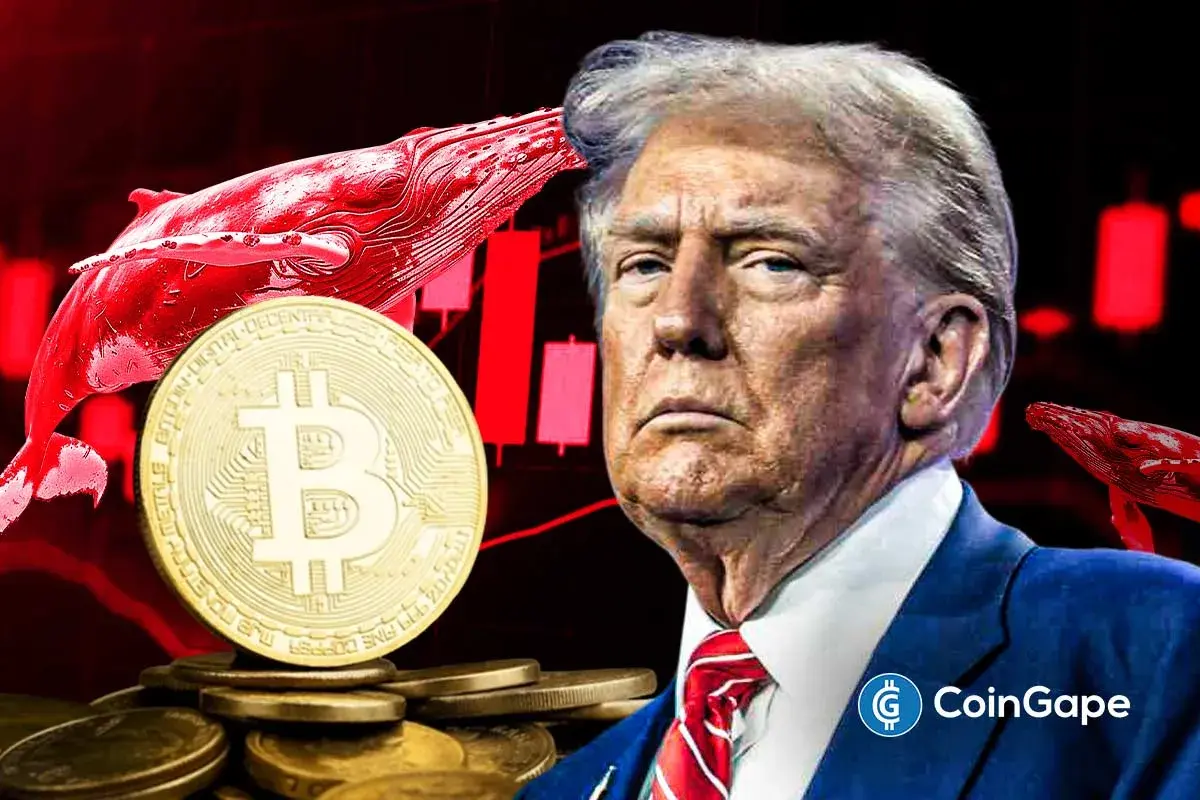Bitcoin & Other Risk Assets Slip Amid US Recession Woes, What’s Next?

Highlights
- Bitcoin and risk assets plunge amid US recession concerns and economic instability.
- Experts warn of slower economic growth, inflationary pressures, and uncertain Fed stance.
- Betting market data showed that there is a 38% chance of a US Recession in 2025.
Bitcoin and other risk assets are facing a sharp downturn as investor sentiment weakens amid growing US recession concerns. The stock market has also plunged, reflecting fears over Trump’s tariff policies and broader economic instability. Analysts warn of slower economic growth, inflationary pressures, and an uncertain Federal Reserve stance.
But can markets recover, or is this the beginning of a larger shift?
Bitcoin & Stocks Plunge as Risk Appetite Fades
Investor confidence is dwindling as macroeconomic pressures mount. The S&P 500 and Nasdaq recorded sharp losses, with the tech-heavy index falling nearly 3.8%. The “Magnificent 7” stocks lost a staggering $830 billion in market value, highlighting the scale of the sell-off.
Bitcoin, often considered digital gold, was not spared amid a selloff recorded in the broader crypto market. BTC price today was down about 1% and exchanged hands at $81,579, while its one-day trading volume soared 33% to $58.7 billion.
Notably, the flagship crypto has touched a 24-hour low of $76,624, reflecting the cautious stance of the investors. Besides, a recent report hints at a further BTC dip to $70K, which has weighed on the traders’ sentiment.
Meanwhile, analysts at QCP Group noted that post-election optimism is fading, with put option volumes reaching their highest levels since 2020. Despite concerns, there are some silver linings. The report noted that falling 10-year Treasury yields and a weakening US dollar historically support equities, Bitcoin, and other digital assets. However, investors remain cautious amid policy uncertainty and economic risks.
Bitcoin Dips As Trump’s Tariff Policies Spark Economic Concerns
According to the latest report from Yahoo Finance, Goldman Sachs has slashed its 2025 US GDP growth forecast from 2.4% to 1.7%, citing adverse trade policy assumptions under Trump. The investment bank also raised its inflation projection, expecting the Federal Reserve’s preferred gauge to hit 3% by year-end.
The revised outlook highlights the economic strain from rising tariffs. Goldman Sachs economist Jan Hatzius outlined three major impacts: higher consumer prices, tighter financial conditions, and delayed business investments. These factors could stifle economic growth and weigh on market performance.
Morgan Stanley echoed similar concerns, cutting its 2025 GDP forecast to 1.5% from 1.9%. Chief economist Michael Gapen also raised his core PCE inflation forecast to 2.7%, up from a previous 2.5% estimate.
The lingering inflation threat may force the Fed to hold interest rates steady longer than expected. Having said that, these could impact the risk-bet assets like Bitcoin as well as the stock market. All eyes are now on the upcoming US CPI inflation data, which would provide more cues on the US economic health and the current inflationary pressure.
Is a US Recession on the Horizon?
Recession fears are gaining traction. Former PIMCO CEO Mohamed El-Erian increased his US recession probability estimate to 25-30%, up from 10% earlier this year. Betting markets reflect similar concerns, with Polymarket estimating a 38% chance of a recession being officially declared by year-end.

Uncertainty over Trump’s fiscal policies and the Federal Reserve’s stance has created a volatile market environment. The Fed may still cut rates twice this year, in June and December, but near-term uncertainty could keep them on the sidelines. Considering that, it appears that Bitcoin and the broader financial market may take a hit in the coming days as the macroeconomic concerns continue to dampen the sentiment.
- Bitcoin vs Gold Feb 2026: Which Asset Could Spike Next?
- Top 3 Reasons Why Crypto Market is Down Today (Feb. 22)
- Michael Saylor Hints at Another Strategy BTC Buy as Bitcoin Drops Below $68K
- Expert Says Bitcoin Now in ‘Stage 4’ Bear Market Phase, Warns BTC May Hit 35K to 45K Zone
- Bitcoin Price Today As Bulls Defend $65K–$66K Zone Amid Geopolitics and Tariffs Tensions
- COIN Stock Price Prediction: Will Coinbase Crash or Rally in Feb 2026?
- Shiba Inu Price Feb 2026: Will SHIB Rise Soon?
- Pi Network Price Prediction: How High Can Pi Coin Go?
- Dogecoin Price Prediction Feb 2026: Will DOGE Break $0.20 This month?
- XRP Price Prediction As SBI Introduces Tokenized Bonds With Crypto Rewards
- Ethereum Price Rises After SCOTUS Ruling: Here’s Why a Drop to $1,500 is Possible
















